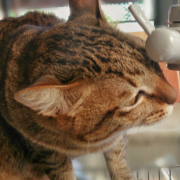Easily fixed water leaks in American households account for nearly one trillion gallons of water wasted annually. The average household leaks nearly 10,000 gallons of water every year. This would wash 300 loads of laundry and could cost you an additional 10% on your water bill.
Fix-A-Leak Week 2020 is March 16-22. It was created by the U.S. Environmental Protection Agency and is supported by WaterSense partners across the U.S. and Canada, including the San Diego County Water Authority and many of its 24 member agencies.
The Sweetwater Authority will join other water agencies in California, Texas, and Oregon for a Fix-A-Leak Week 2020 “Twitter Party” to help consumers virtually with tips on tracking down leaks and other ways to save water.
In 2019, “leak detectives” across the U.S. put their tools, checklists, and dye tablets to work in bathrooms, kitchens, at faucets and spigots around their homes and joined EPA in the annual Fix a Leak Week by donning their leak detective hats and grabbing their sleuthing gear to find and fix common household leaks. Leaks were detected and fixed in bathrooms – toilets, showerheads and faucets, outside at spigots and in many other locations.
It takes just 10 minutes to perform a quick search of your home for leaks. Many of the most common leaks are easy for anyone to fix such as worn-out toilet flappers, leaky showerheads, and dripping faucets. They require basic tools and hardware.
Here are a few handy tips for finding leaks:
- Check your water meter before and after a two-hour period when no water is being used. If the meter changes at all, you probably have a leak.
- Identify toilet leaks by placing a drop of food coloring in the toilet tank. If any color shows up in the bowl after 10 minutes, you have a leak. Flush immediately after this to avoid staining the tank.
- Turn on your shower and look for drips or stray sprays you can stop with tape.
- Under sinks, check for pooling water under pipes. Look for rust around joints and edges caused by leaking water.
- Check under your water heater tank for pooling water, rust, or other signs of leaks.
- Check all spigots outside. Fixing a leak might be as simple as securing the hose connection, or replacing a worn-out washer.
Find more guides and videos you might find helpful in finding and fixing leaks on the EPA’s “Fix-A-Leak Week” website.



